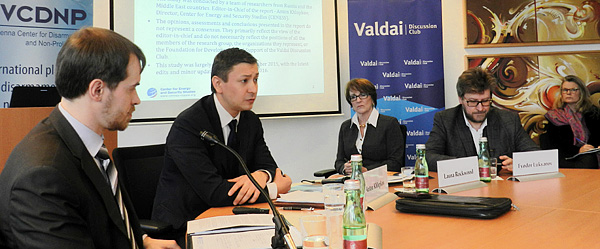
On 29 January, the VCDNP, in collaboration with the Valdai Discussion Club and the Center for Energy and Security Studies (CENESS), hosted the launch of a report on "Nuclear Power in the Middle East: Russia's Interests", produced by CENESS and funded by the Valdai Discussion Club. The launch featured Fyodor Lukyanov, Academic Director of the Foundation for Development and Support of the Valdai Discussion Club, Anton Khlopkov, the Director of CENESS and Dmitry Konukhov,a Research Associate with CENESS.

After introductory remarks by Mr. Lukyanov, Mr. Khlopkov and Mr. Konukhov presented the findings of the report, which aimed at analyzing the impact of the Arab Spring and the Fukushima nuclear accident on plans and prospects for nuclear energy development in the region, and Russia's potential role in implementing those plans.
Mr. Konukhov explained that, before the Fukushima accident and the Arab Spring, a number of countries in the Middle East had had very ambitious nuclear energy plans. The reasons for developing nuclear energy in the region included increasing electricity demand, energy source diversification and public acceptance. Regional competition and the prestige involved in developing nuclear energy were also factors that played a role in this regard. Between 2005 and 2010, at least 13 countries in the region had announced plans for building nuclear reactors that would have represented 90 units by 2030. He noted, however, that these numbers were now lower due to a number of challenges that countries in the region faced, including not only technical aspects, such as seismic issues, water supply, infrastructure and human resources, but also political matters, such as government instability.
Mr. Konukhov discussed a number of factors that changed nuclear energy development in the region. In this context, he argued that some of the nuclear energy plans announced by policy-makers in the region had been driven by political considerations and not based on well-developed plans. The Fukushima accident had led to a crisis of confidence in nuclear energy and made clear that some of the regional nuclear energy plans had been too ambitious. He suggested that a positive impact of that accident was that the nuclear energy plans had become more realistic now. Another factor that had affected previous plans was the Arab Spring, which had led to instability in a number of countries in the region, delaying nuclear energy plans in some of those countries. Other factors that had affected nuclear energy plans in the region included declining oil prices, the Iran deal, the security situation in the region, and Russian-Turkish relations.
Mr. Konukhov explained that there were now only three countries in the region with active nuclear energy plans: Iran (its Bushehr nuclear reactor is already in operation); the United Arab Emirates (with four units currently under construction); and Turkey (where the licensing process for reactor construction was ongoing). On Turkey, he stated that the existing construction timeframe might be revised due to the current political situation.
Mr. Konukhov offered two possible scenarios for nuclear energy development in the region by 2030. In an optimistic scenario, there will be 33 reactors in operation in six countries in the Middle East. In a pessimistic scenario, there will be 11 units operating in three countries (Turkey, Iran, and the UAE) by 2030.
Mr. Khlopkov followed Mr. Konukhov's presentation with a focus on Russian Federation interest in the nuclear energy plans of the region. He noted that there are currently 38 Russian reactors in operation in 10 countries outside Russia and that there are at least 25 potential new units in 12 countries, including countries of the Middle East. Furthermore, the Russian Federation had signed several intergovernmental agreements for a number projects. In this context, he explained that, in the Russian Federation, three agreements were necessary for the construction of nuclear reactors: an intergovernmental agreement on peaceful nuclear energy cooperation; an intergovernmental agreement on cooperation in the construction of a nuclear power plant; and a general contract for the construction of the nuclear power plant. Russia had concluded at least the first of these agreements with 8 countries in the Middle East. General contracts were already in place with Iran and Turkey. All Russian agreements with the countries in the region for the construction of nuclear power plants contain clauses related to nuclear non-proliferation and nuclear security, such as the take back of spent nuclear fuel supplied by Russia.
Mr. Khlopkov indicated that it was not very likely that the optimistic scenario identified in the report would be come to pass. He noted, however, that if more countries moved forward with their nuclear energy plans, Russia could provide not only reactor technology (e.g. for Egypt, Jordan, Iran, and Turkey) but fuel services for countries in the region (e.g. United Arab Emirates and Saudi Arabia).
Download the full text of the report. (7,1 MB)
Download the report with high resolution infographics. (31,3 MB)